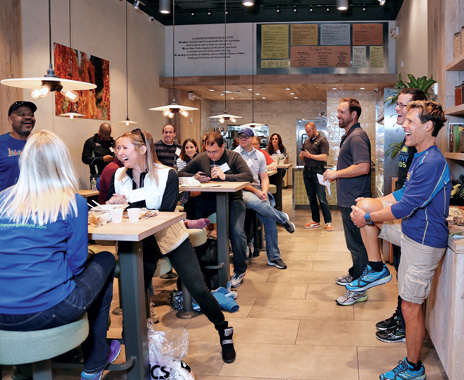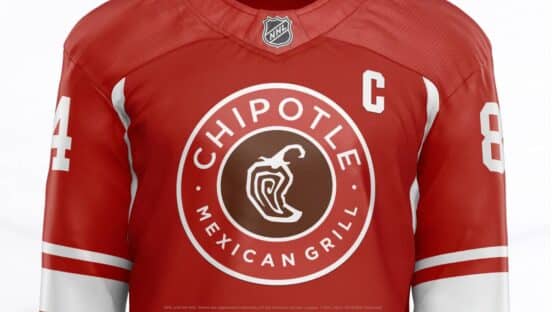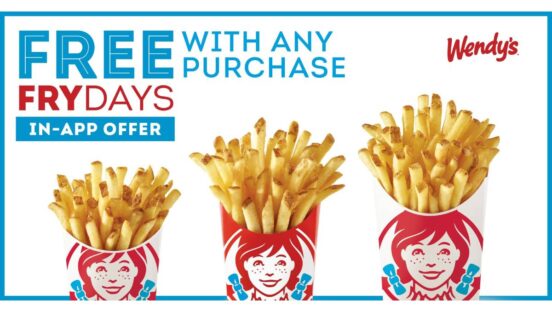The idea of quick-service brands promoting an active lifestyle among their customers is not new. McDonald’s did it in 2004 with Go Active, through which it passed out stepometers in a line of Happy Meals for adults and heavily promoted play for kids. Chick-fil-A has been quietly sharing exercise tips on its website and packaging for a decade. Its “Exercise Makes a Difference” content lists easy and low-impact ways to incorporate exercise into lifestyles. And we can’t forget the time Yum! Brands gave Taco Bell, Pizza Hut, KFC, Long John Silver’s, and A&W guests free four-week memberships to Bally Total Fitness.
What is new is how, in an age when promoting health is paramount and upstart fast-casual brands are thriving on a more wholesome image, these kinds of promotions are being marketed. These days, health-forward fast casuals like Nanoosh, FX3 Fit Food Fast, CoreLife Eatery, and Protein Bar are developing authentic voices in the conversation about health, nutrition, and fitness in their communities. Nutritious menu options aside, what they all share is a marketing strategy that allows them to engage with the likeminded in ways that feel sincere versus pandering or paternalistic.
Some might ask why brands should bother. Here’s why: The active lifestyle customer is an ideal one for fast casuals. Zoom Media reports these customers are more likely to be college-educated, and almost half of them have children, which means opportunities for bigger checks and longer-term customers.
Win them over and your brand might have real legs.
Creating a holistic approach
Nanoosh Mediterranean founder David Kostman grew up in a home where health equaled holistic—both mind and body. He operates Nanoosh under that philosophy. It shows up in the menu, staff decisions, brand partnerships, and even the concept’s décor. Because it shows up in all those places, there’s no disconnect when it shows up in the brand’s marketing, too. Nanoosh has earned the right to insert itself into New York City’s often highbrow and elite healthy-eating conversation. And it started with focusing on more than just the food.
“The idea was to bring health and nutrition to the mainstream market in an inexpensive way,” Kostman says. “And we wanted to emphasize healthy-living activities outside of what you can do nutritionally.”
To do that, Nanoosh relies on a strategy that employs a mix of corporate social responsibility, digital content, and traditional local-store marketing tactics. For example, Nanoosh donates dollars, meals, and time to Action for Healthy Kids, a national nonprofit dedicated to healthier schools. Action provides grants and lobbies for better food choices and more play activity on public school campuses. Nanoosh cosponsored Team Healthy Kids, the group’s marathon team, during the 2015 New York City Marathon. All profits from first-day sales at a new Rockefeller Center location went to the nonprofit, too.
The partnership is mutually beneficial. Action for Healthy Kids gets much-needed dollars and support for its mission; Nanoosh becomes visible to consumers who care about holistic health. In addition, Action for Healthy Kids’ national reach will become even more beneficial as Kostman takes Nanoosh’s message of wholesome health beyond the five boroughs. A seventh location is opening in Boston soon, while Europe already has one, in Berlin.
“We focused on more than food from the beginning,” Kostman says. “In the end, I do believe it drives business. It’s a trend that’s good for everyone.”
In addition to its charitable activities, Nanoosh also invests marketing dollars in wellness-related content for its site and blog. A third-party agency creates posts like “5 Outdoor Activities for When the Weather Hits 60” and “Why Your Boss Wants You To Leave The Office At Lunch.”
“Our blog reflects our mission and the interests of our guests,” Kostman says. “Our content strategy is driven by what we care about.”
An impactful commitment
Chicago-based Protein Bar also relies on partnerships and targeted content to keep it top of mind among active-lifestyle enthusiasts. The 17-unit chain marries the two in its content-sharing relationship with Chicago health consultancy Aligned Modern Health. Aligned’s personal training and nutrition coaches are regularly featured on the Protein Bar Tumblr page.
The two groups recently partnered on a fitness challenge, “Commit to Fit.” Teams earned points for good self-care decisions, including things like time with friends and massages. Aligned coaches offered encouragement, recipes, and workouts via Protein Bar’s social feeds and blog throughout the 21-day challenge.
“We chose Aligned Modern Health as our primary content partner because they have a similar holistic perspective on health, with experts from personal training to medical disciplines to the science of nutrition,” says Samir Wagle, Protein Bar CEO. “They were planning to do similar programming … and we realized we could make something more impactful together.”
“Commit to Fit” worked like this: Participants self-tracked activities through a customized Daily Endorphin app competition and earned additional points for using the #PBfit hashtag on social media. Protein Bar visits, which were tracked through its loyalty app, brought more bonus points. At stake was a $2,016 donation to the charity of the winning team’s choice. More than 300 people signed up; 100 actively participated. Protein Bar got 150 new app users.
Wagle estimates total hard costs came in under $5,000. “The majority of the costs were related to loyalty app bonus offers and the grand-prize donation,” Wagle says.
Aligned is not the only health-focused partner Protein Bar works with. The brand’s online “How I Thrive…” series details the morning routines of local gym and training stars. Its stores regularly host “Healthy Hours” with local wellness practitioners where mocktails and Protein Bar bites are served. Author appearances are not uncommon, either. All is fodder for online content, designed to drive engagement and brand affinity.
And it’s working. In 2015, members of Team Protein Bar celebrated 10,000 unique Twitter and Instagram followers by running a 10K relay through downtown Chicago, stopping at each Protein Bar along the way.
Beyond the four walls
Upstate New York’s CoreLife Eatery also focuses on in-store wellness events to build engagement.
“The most successful concepts today have found ways to connect beyond the four walls,” says CoreLife Eatery spokesman Stephen J. Donnelly. “Some concepts use music; some connect through sustainable sourcing values. We saw a natural connection between our food and sporting, exercise, and active lifestyles.”
Along those lines, CoreLife regularly moves a few tables around to turn itself into a “pop-up yoga studio,” offering complimentary morning classes to the public. While the kitchen staff preps for the day, hundreds strike poses. Almost a year into the program, more than 400 yoga enthusiasts have passed through the doors of CoreLife’s suburban Syracuse, New York, location. Event pics provide social content that further reinforces CoreLife’s active lifestyle positioning.
“It’s always tough to put a dollar value on a specific event or even a series in the short term, but we can safely say that we continue to see many new customers every day, and our business continues to build after each event,” Donnelly says. “At this point, we look for events that are consistent with our values and help support local causes.”
The fast-casual concept is also heavily involved in the local runners scene. It served 30 gallons of its signature bone broth to athletes participating in the annual Lake Effect Half Marathon in Syracuse and hosted a pre-race dinner and meet-and-greet for race staff last year. The year-old concept also supported the Tipperary Hill Shamrock Run by selling T-shirts in the store, hosting pre-race and post-race festivities, and giving away prizes for best running attire.
Game on
Fellow Upstate New York fast casual Fx3 Fit Food Fast has found value in partnering with local schools to build its credibility in the wellness space. Since Fx3 opened a year ago in Queensbury, New York, 20 eighth-grade home economics classes have visited the store for a lesson on making good decisions while dining and the importance of staying active.
As part of the lesson, students fill out a questionnaire about which sports and activities interest them. The payoff is twofold: It gets the kids thinking about what they do or could do in terms of promoting their own health, and it also gives Fx3 insight into what its next generation of customers likes.
The brand also takes an educational approach to its youth sports sponsorships. Local teams come in for free pre- and post-game smoothies and leave with lessons on the importance of refueling with nutritious foods and avoiding certain others while training. Coaches buy in because of the team-building aspect. And, again, for Fx3, it’s an opportunity to build loyalty and drive new-customer trial.
“I’m seeing a lot more high school and college-age kids eating healthy,” says cofounder Joe McCrudden, who, along with his partners, has run full-service eateries for years. “You want to train kids at an early age so you’re not trying to change a lifestyle. We want to attract and engage with someone who believes in health and fitness, because they are the people who are going to come in four to five times a week.”
The numbers back him up. According to Gallup’s 2014 “The State of the American Consumer” report, fully engaged fast-food customers make 28 percent more visits per month than actively disengaged customers.
Indeed, leveraging wellness as a key differentiator is a sound business move. Consumers the world over are concerned about health and fitness. The International Food Information Council (IFIC) Foundation’s 2015 Food and Health Survey reports that 36 percent of respondents say if they had an extra four hours a day, they’d spend the time exercising. Consumers questioned for Canadean Ltd’s “Global and Regional Mega-Trends: Understanding Consumer Attitudes and Behaviors in Health and Wellness” survey found that customers were conscious about their long-term health as a result of their lifestyles and wanted to take active steps to address this.
By offering tips, tools, and access to wellness initiatives, brands like Fx3, CoreLife, Protein Bar, and Nanoosh are positioning themselves as more than just restaurants. They are also resources. And who doesn’t love a free resource?









